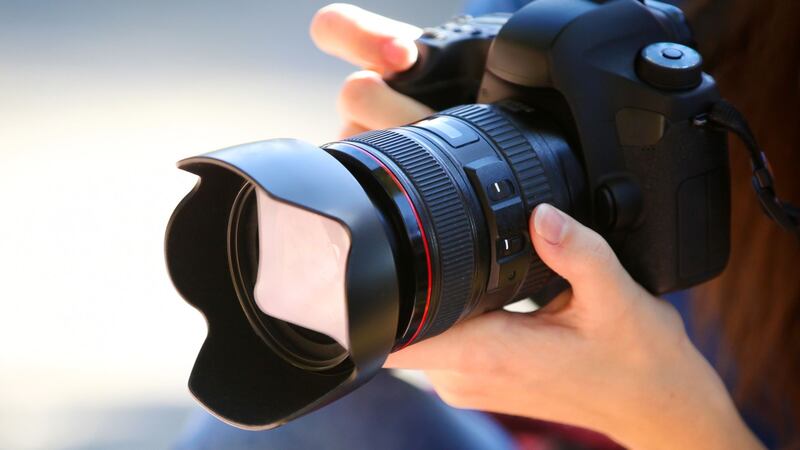Shubnum Khan advertises a lot of different products – from McDonald’s in China to villas in Florida – and is the smiling face of immigration in at least two countries.
But Khan, an author from South Africa who is published by Penguin, had not intentionally tried to get work as a stock photo model and doesn’t endorse any of the products now linked to her face.
When her picture was first spotted by a friend – explaining the virtues of immigration in Canada – she started to piece together what had happened.
Naturally I was shocked and… confused. I studied the pic and agreed that it was me. Now I didn't mind that I was promoting immigration in Canada but I couldn't understand why my face was in a paper all the way on that side of the world. pic.twitter.com/GBquWEFlek
— Shubnum Khan (@ShubnumKhan) July 28, 2018
At university some years earlier, she and friends had had pictures taken for a project. The photographer had also taken three pictures of her in different facial poses, and unwittingly Khan had signed over the rights to her image.
took photos of 100 various faces of all ages & races in Durban. Young friends & I were excited; we signed a release form at the start (I thought it was to give him permission to use the photos for his portfolio). We didn't read the small print. I know. It was stupid. pic.twitter.com/wAykaSpcub
— Shubnum Khan (@ShubnumKhan) July 28, 2018
The small print meant the photographer could sell Khan’s pictures and buyers could use it as they wished – even assigning her a different identity and modifying the pictures digitally.
Also this could have gone badly – my photo could have come up in a wrong place (I mean, the right to 'distort photo and character!') is scary af and so if anything, I hope my story is also a cautionary tale to be careful what you sign
— Shubnum Khan (@ShubnumKhan) July 28, 2018
because while it's occasionally funny to randomly come across your face on a board at the McDonalds in China, you also don't want to be Dina M, complaining about post pregnancy melasma to the internet or calling out for prince charming on a white horse (ok, that bit is okay). pic.twitter.com/ykCvcZXNBE
— Shubnum Khan (@ShubnumKhan) July 28, 2018
Her ethnicity “varies according to whim” depending on who is using the picture and why, Khan said about the examples of which she has become aware.
Also, I love my ethnicity varies according to whim. I'm Seng Bonny leading Cambodian tours, Phoebe Lopez from San Francisco, Kelsi from San Francisco, Chandra from California, Christine from LaTrobe Uni, Dina M etc. pic.twitter.com/p105obTnLH
— Shubnum Khan (@ShubnumKhan) July 28, 2018
On a website for villas to rent in Florida, Khan becomes Kelsie from Arizona who stayed for a family trip to Disneyworld. The testimonial suggests she would “likely stay again”, despite the fact that she had to buy her own toilet paper and paper towels.
While some adverts were “innocent enough”, say for dental sedation, others were about removing eye bags, post-pregnancy melasma and hyperpigmentation cream.
Amusingly for an author, her picture is used on the front cover of at least three non-fiction books.
Khan shared the full story in a thread on Twitter which she billed as a cautionary tale – urging people to be sure what they are signing with regards to pictures and how they could be used by others in the future.
Be clever. Be aware. Don't get caught up. I'm sure I could have made some money out of this, but instead I'm out there promoting acne cream while someone else gets the profits.
And now you know.
— Shubnum Khan (@ShubnumKhan) July 28, 2018
She has managed to get the photographer to take her image down from sale only because her real work is getting her known and recognised.
But people responded to Khan’s thread revealing even more places where her image was being used.
Okay, I'm laughing (broke but laughing). https://t.co/GjP7yJQrIK
— Shubnum Khan (@ShubnumKhan) July 29, 2018
Hi you’re in my psychology textbook at school. Your smile is the only thing getting me through chapter 8 at the moment. Have a nice day 👍🏻
— bronte (@lukehemmotops) July 28, 2018
And if that wasn’t enough, Khan has more capers to talk about.
So today I'm going to tell you the Strange Story of How I Ended up as a Bride on a Rooftop in Shanghai.
— Shubnum Khan (@ShubnumKhan) June 3, 2018
I have a much weirder story. But it’s one I won’t be ready to tell for a long time. Maybe one for the memoir. https://t.co/A9X7Y3chYK
— Shubnum Khan (@ShubnumKhan) July 29, 2018
Bodes well for her book.








